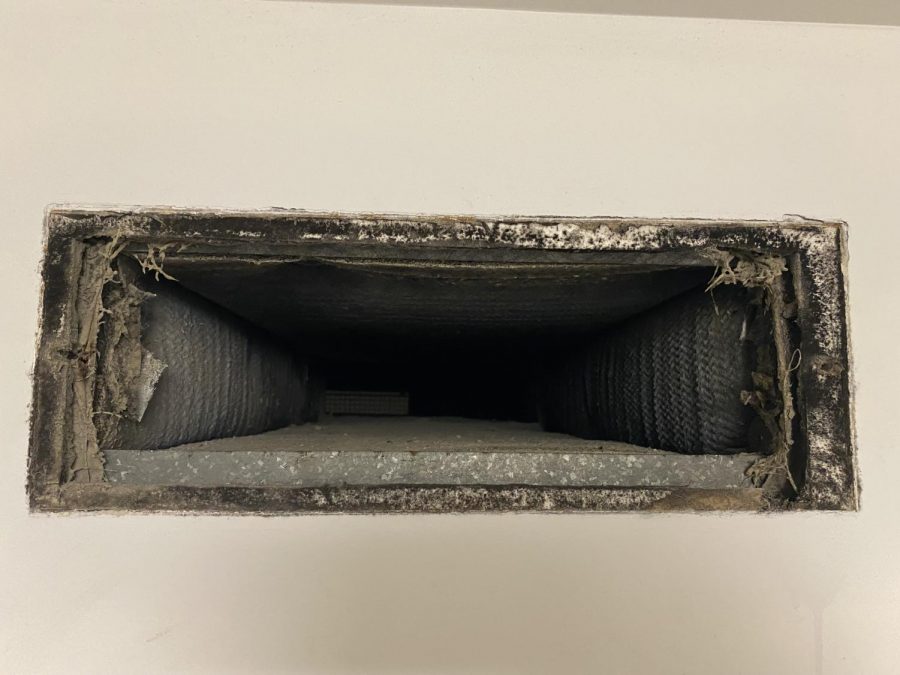The university takes mold prevention steps in residential housing communities
Almeida, Bayside, Stonewall and Willow have had reports of localized mold
Mold found in the vents in a Bayside Tidewater apartment.
Throughout the months of October and November, Roger Williams University residence halls saw a new problem rise to prevalence. Mold. A total of 168 work orders related to mold were placed between Oct. 1 and Nov. 12 according to Associate Director of Residence Life & Housing Tim Valton.
Valton attributed the increased mold issues in campus housing to a multitude of factors, including air conditioning units being kept on longer than in the past due to warmer and more humid outside temperatures further into the fall which lead to the buildings “sweating” more with “condensation from air handlers in the building then create small droplets on vents which
is a condition for mold to grow.” As well as residents leaving their windows open for prolonged periods of time which can bring more humid air into residential communities. Lastly, dust accumulates which provides “food” for mold to grow.
Housing has received reports of localized mold from units in Almeida, Bayside, Stonewall and Willow.
“The circumstances and levels detected and tested are fairly consistent in each of these buildings,” said Valton. “Every report and location received has been assessed by [Environmental Health and Safety] (EHS) and Facilities [Management] for safety reasons and nothing has risen to a level of ‘significance’ which would require relocation of students or a safety concern.”
In terms of a mold response, Valton said all air handler vents in Stonewall have been cleaned and disinfected and a similar process in Willow is expected to be finished early next week. An outside company has been hired for return vent cleaning in Stonewall which began Thursday.
Localized reports of mold have been addressed in Almeida and Bayside. Housing plans to conduct a similar process to what has been done in Stonewall to Almeida, Bayside, Baypoint, and North Campus Residence Hall over winter break.
Facilities have been checking and replacing any broken fans in common area bathrooms which trap moisture in the unit.
An outside environmental vendor has been hired to test for mold spores in heightened areas of concern and while some results are still pending, the vendor “expressed no concerns when investigating and seeing the areas in question and provides a summary for each area and outlines where improvements can be made,” said Valton.
In response to mold in campus residence halls, a Students Against Mold (S.A.M) Instagram account was made by two students who wish to remain anonymous. The students said they both have allergies to mold and asthma. When they had their vents cleaned for mold, it “caused quite a reaction for one of us. It triggered the allergies and asthma, causing a need for medication and doctors visits.”
The account was made on Oct. 26 and has amassed almost 280 followers as of Nov. 17. Posts consist of mold illness-related symptoms, updates on the campus mold situation, and pictures of mold on campus.
The two students said they are not sure how long they will keep the account in operation.
“If the mold situation gets taken care of, students feel heard and administrators take action then we may not need the account anymore. But until that day comes, we will continue to support the students of RWU.”
Director of Health Services Anne Mitchell said mold allergy symptoms could be sneezing, runny nose, congestion, cough, post-nasal drip, itchy, watery eyes, red eyes, an itchy throat and less commonly dry scaly skin.
When students have mold allergy symptoms, Mitchell said “we cannot, with full competence make any comment to the student that you’re here with these symptoms because of mold. We just can’t do that no matter what season it is, but especially fall when we have flu, COVID, and just your regular common colds on campus.”
Valton said housing fully supports and expects students to advocate for their educational and living needs and to speak up when things are not going right.
“We empathize that this has happened and are addressing all work orders in a proactive and timely manner,” said Valton. “I would just add that formal work orders help us greatly to create a plan and take action to help remedy the situation.”

Jimmy Sadowski is a journalist with experience in print, multimedia, and broadcast journalism. Sadowski’s specialty is news, but can also provide...






